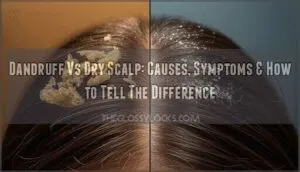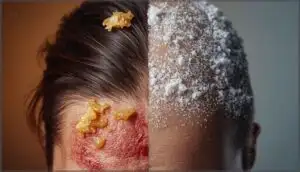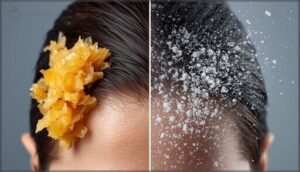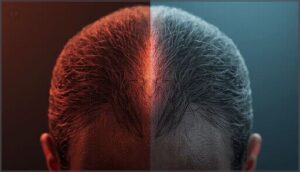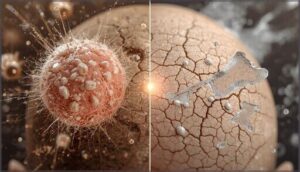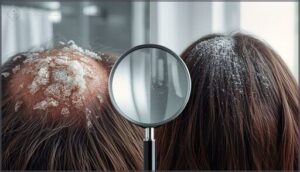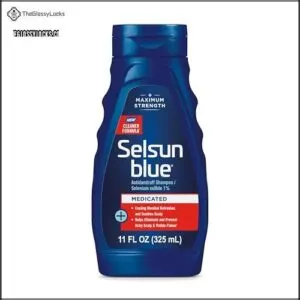This site is supported by our readers. We may earn a commission, at no cost to you, if you purchase through links.
You scratch your scalp and watch white flakes drift onto your shoulders—but what’s actually causing them? Many people assume all flakes mean dandruff, yet half the time, they’re treating the wrong problem entirely.
The distinction between dandruff and dry scalp isn’t just semantic; it’s the difference between fighting a fungal overgrowth and simply needing more moisture. Dandruff stems from an oily scalp where Malassezia yeast thrives, producing larger yellowish flakes and persistent irritation. Dry scalp, by contrast, results from dehydration—your skin can’t retain moisture, so it sheds fine, powdery white particles.
Recognizing which condition you have determines whether you need antifungal ingredients or a hydration boost, saving you from wasting time on treatments that won’t work.
Table Of Contents
Key Takeaways
- Dandruff stems from Malassezia yeast thriving in oily scalps and produces larger yellowish flakes with persistent inflammation, while dry scalp results from moisture depletion and sheds fine white powdery particles—misidentifying which condition you have wastes time on ineffective treatments.
- The flake size and texture reveal the diagnosis: dandruff creates 2-4mm oily clusters that cling to hair, whereas dry scalp produces flakes under 1mm that fall away easily, with dandruff being a chronic lifelong condition requiring continuous management and dry scalp typically resolving within days to two weeks once moisture is restored.
- Effective treatment depends entirely on correct identification—dandruff requires antifungal ingredients like ketoconazole or zinc pyrithione to control fungal overgrowth, while dry scalp responds to sulfate-free formulas, moisturizing treatments, and natural oils that restore the skin’s hydration barrier.
- Your daily habits directly influence both conditions: stress increases scalp oiliness by 15-20% and feeds fungal growth, harsh shampoos strip protective oils worsening dryness, and dietary choices like zinc and omega-3 intake support scalp health while sugar and processed carbs fuel inflammation.
Dandruff Vs Dry Scalp: Key Differences
While dandruff and dry scalp can look similar at first glance, they’re fundamentally different conditions that require distinct approaches. Understanding what sets them apart will help you choose the right treatment and avoid wasting time on products that won’t work.
Let’s break down the key differences you’ll want to watch for.
Distinguishing Symptoms
How can you tell which condition you’re dealing with? Start with a simple flake analysis—dandruff produces larger, yellowish, oily flakes that stick to your hair, while dry scalp sheds smaller, white, powdery flakes. Your scalp irritation matters too: dandruff often brings persistent itch patterns with redness levels indicating inflammation, whereas dry scalp itch stems from tightness and moisture loss. Understanding the scalp environment factors is essential in determining the difference between dandruff and dry scalp.
| Symptom | Dandruff Symptoms | Dry Scalp Symptoms |
|---|---|---|
| Flake Type | Larger, oily, yellowish | Smaller, dry, white |
| Scalp Condition | Oily with red patches | Dry, tight, non-oily |
| Itchy Scalp | Persistent despite moisture | Worsens with dryness |
| Symptom Variations | Extends to eyebrows, face | Often with body dryness |
Visual Appearance of Flakes
Beyond symptoms, learning to spot the differences in flake appearance will sharpen your diagnosis. Dandruff flakes measure 2–4 mm—you’ll see larger, yellow-tinged pieces on your shoulders with an oily texture that clings to hair. Dry scalp sheds white, powdery flakes under 1 mm that fall away easily. Under microscopic features analysis, dandruff shows clumped cells with retained nuclei, while dry scalp reveals simple, uniform aggregates. Understanding the dandruff causes is essential for effective treatment and management.
| Visual Feature | Dandruff | Dry Scalp |
|---|---|---|
| Size | 2–4 mm (large clusters) | Dandruff is a chronic lifelong condition affecting 50% of people, while dry scalp resolves within weeks once moisture is restored |
| Feature | Dandruff | Dry Scalp |
|---|---|---|
| Course | Chronic, lifelong management | Temporary, episode-based |
| Relapse Rate | 49.5% within 1 month off treatment | <10% chronic cases |
| Resolution Time | Requires continuous prevention | Days to 2 weeks with care |
Scalp Sensations (Itchiness, Redness, Irritation)
How your scalp feels matters as much as what you see. Itchiness affects 66% of dandruff patients—often intense, persistent, tied to fungal inflammation and oil buildup. Dry scalp itch feels different: tighter, milder, triggered by moisture loss rather than yeast overgrowth. Redness signals inflammation in both conditions, though it’s more pronounced with dandruff’s seborrheic component.
| Sensation | Dandruff | Dry Scalp |
|---|---|---|
| Itch Character | Persistent, oil-related | Tight, dryness-related |
| Redness Frequency | Common with inflammation | Mild, sporadic |
| Irritation Trigger | Malassezia fungus, sebum | Moisture depletion, environment |
Causes and Triggers of Each Condition
Understanding what’s behind your scalp issues is the first step toward finding relief. Dandruff and dry scalp stem from completely different root causes, even though they might look similar at first glance.
Let’s break down what triggers each condition and the factors that can make them worse.
Dandruff Causes (Oil, Malassezia, Microbiome)
Your dandruff stems from a disrupted scalp ecosystem where excess oil fuels Malassezia yeast overgrowth. About 50% of people react negatively to this fungus, triggering faster skin cell turnover and those telltale flakes.
It’s basically a mild form of seborrheic dermatitis—a microbiome imbalance where fungal infections thrive. The more sebum your scalp produces, the more this yeast proliferates, creating an inflammatory cycle that disrupts oil regulation.
Dry Scalp Causes (Moisture Loss, Environment, Age)
Unlike dandruff’s fungal origins, your dry scalp results from moisture imbalance—when your skin can’t produce or retain enough hydration. Environmental factors like cold weather, low humidity, and even hard water strip away natural oils.
Age-related changes matter too: sebum production drops sharply after 50, accelerating dryness. Harsh shampoos worsen this by removing protective oils your scalp needs for proper hydration and overall scalp health.
Risk Factors and Aggravating Habits
Surprisingly, everyday habits often trigger both conditions. Stress management becomes essential—chronic tension increases scalp oiliness by 15-20%, fueling fungal growth. Your hair product choices matter too: gels and sprays trap sebum, worsening dandruff by 25-30%.
Poor scalp hygiene, wearing tight headgear in humid environments, and lifestyle changes like dehydration heighten risk factors. Hormonal imbalance also disrupts oil production, creating conditions where both dry scalp causes and causes of dandruff flourish.
How to Identify Your Scalp Issue
You don’t need a dermatologist to start figuring out what’s happening on your scalp. A few simple observations at home can point you in the right direction.
Here’s how to examine your scalp and recognize the telltale signs of each condition.
At-Home Examination Techniques
You can conduct a thorough self-diagnosis at home using simple observation methods. Start with flake analysis—collect flakes on dark fabric to assess their size, texture, and color under good lighting.
Perform scalp mapping by sectioning your hair to identify oily versus dry patches. Use hair observation to note greasiness or brittleness, and practice itch tracking to monitor scalp symptoms over several days for accurate dandruff vs dry scalp differentiation.
When to Suspect Dandruff
If you notice larger, yellowish flakes that cling to your hair strands—especially paired with scalp oiliness—you’re likely dealing with dandruff symptoms rather than simple dryness. Redness signs, persistent itchiness patterns, and flakes extending to your eyebrows or behind your ears point toward seborrheic dermatitis.
Your scalp examination should reveal greasy patches, and these dandruff hallmarks usually worsen without targeted dandruff treatment using medicated itchy scalp remedies.
When to Suspect Dry Scalp
Your scalp feels perpetually tight and never develops that oily buildup dandruff creates—that’s the telltale signal pointing toward dry scalp symptoms. Look for these dry scalp causes:
- Tiny, powdery white flakes that fall easily rather than stick to hair strands
- Constant itchiness without visible greasiness, signaling scalp moisture loss
- Seasonal worsening when cold, dry air strikes
This flake identification guides your dry scalp treatment approach.
Treatment Options for Dandruff and Dry Scalp
Once you’ve identified whether you’re dealing with dandruff or dry scalp, the right treatment approach can make all the difference. The good news is that both conditions respond well to targeted care, though they require different strategies.
Let’s walk through your options, from drugstore solutions to prescription treatments and the daily habits that keep your scalp healthy.
Over-the-Counter Remedies
You’ll find relief starts at your local pharmacy. For dandruff treatment, look for shampoo ingredients like zinc pyrithione, ketoconazole, or salicylic acid—these OTC alternatives target the fungal overgrowth directly.
If you’re dealing with dry scalp treatment instead, sulfate-free formulas and scalp masks work better.
Natural treatments like coconut oil or tea tree oil can supplement either medicated shampoo approach, though home remedies alone won’t resolve stubborn dandruff.
Prescription and Medicated Shampoos
When over-the-counter options don’t resolve your symptoms, prescription-strength medicated treatments become necessary. Your dermatologist may recommend ketoconazole 2% shampoo—clinical trials show it reduces dandruff severity by 73% within four weeks through its antifungal properties.
Selenium sulfide and coal tar formulations offer alternatives for stubborn cases. These prescription options target Malassezia more aggressively than standard dandruff shampoo, delivering faster relief from scaling and itchiness.
Moisturizing and Home Care Tips
Beyond medicated formulas, hydrating products and home remedies restore moisture balance. For dry scalp relief, consider:
- Scalp massage with natural oils like coconut or jojoba to stimulate circulation
- Aloe vera gel to retain moisture and reduce irritation
- Moisturizing conditioner after gentle shampooing
- Exfoliation tips: weekly apple cider vinegar rinses remove buildup
- Hydrating products with hyaluronic acid for sustained relief
These scalp hygiene and moisturizing practices support your dry scalp care routine effectively.
Preventative Hair Care Practices
Building on these home remedies, your hair care routine shapes long-term scalp health. Start with a gentle shampoo 2-3 times weekly—lukewarm water preserves natural oils better than hot.
Regular scalp massage with hair oil boosts circulation, while a healthy diet rich in zinc and omega-3s nourishes your scalp from within.
These daily routine adjustments prevent both dandruff and dry scalp naturally.
Top Dandruff and Dry Scalp Products
Once you’ve identified whether you’re dealing with dandruff or dry scalp, choosing the right product can make all the difference. While the market is flooded with options, certain formulations consistently stand out for their effectiveness and reliability.
Here are two tried-and-true products that dermatologists regularly recommend to their patients.
1. Nizoral Anti Dandruff Shampoo Treatment
Ketoconazole effects set Nizoral apart as a dermatologist-recommended option for stubborn dandruff. This medicated shampoo targets Malassezia fungus directly, with clinical trials showing 80% of users experiencing relief within four weeks.
The shampoo ingredients—specifically 1% ketoconazole—work by disrupting fungal growth while supporting scalp health. You’ll notice improvement in dandruff vs dry scalp symptoms like flaking and itching when used twice weekly.
While pyrithione zinc offers gentler alternatives, ketoconazole’s potent antifungal properties make it ideal for treating fungal infections and achieving lasting treatment outcomes in seborrheic dermatitis cases.
2. Medicated Antidandruff Scalp Treatment Shampoo
Selenium sulfide shampoos deliver maximum-strength dandruff management through proven antifungal properties. With 1% selenium sulfide as the active ingredient, these medicated shampoos reduce scalp flaking by 78% within four weeks—outperforming pyrithione zinc formulations in comparative trials.
You’ll find relief from persistent itching and irritation when you use this scalp treatment twice weekly. The formula works by controlling Malassezia overgrowth while preventing excessive skin cell turnover.
For stubborn dandruff that doesn’t respond to gentler shampoo ingredients, this medicated approach targets the root cause effectively.
Frequently Asked Questions (FAQs)
What is dandruff & dry scalp?
Dandruff affects about half of all adults—it’s a chronic scalp condition where excess oil and Malassezia yeast cause large, oily flakes.
Dry scalp simply lacks moisture, producing small, powdery flakes instead.
What is the difference between dandruff and flaky dry scalp?
The main difference lies in their root causes and flake characteristics. Dandruff produces larger, oily, yellowish flakes from fungal overgrowth and inflammation, while dry scalp creates smaller, white flakes from simple moisture loss.
Can diet or nutrition affect dandruff?
Your eating habits absolutely matter. Sugary foods and processed carbs fuel inflammation and Malassezia overgrowth, worsening dandruff symptoms.
Nutrient deficiencies—especially zinc, biotin, and B vitamins—compromise scalp health, making targeted dietary adjustments surprisingly effective.
Is dandruff more common in certain seasons?
Yes, dandruff peaks in winter when cold temperatures drop to around 3% prevalence. Indoor heating and low humidity dry your scalp, while reduced UV exposure allows Malassezia yeast to thrive unchecked.
Can children get dandruff or dry scalp?
Both conditions affect kids, though differently by age. Infants commonly develop cradle cap—a form of pediatric dermatitis with oily, yellowish scales—while dry scalp appears when baby skin loses moisture through harsh products or cold weather.
Do hair styling tools worsen scalp conditions?
Heat styling tools and chemical straighteners can strip your scalp of natural oils, leading to dryness, irritation, and flaking.
Frequent use may worsen both dandruff and dry scalp conditions by compromising your skin’s protective moisture barrier.
How long until treatments show results?
Like waiting for dial-up internet, scalp improvement takes patience. Dandruff treatment usually shows symptom relief within two to four weeks with consistent medicated shampoo use, while dry scalp treatment responds faster—often within days.
Conclusion
Think of your scalp as a puzzle with only two pieces—yet choosing the wrong one unravels everything. Understanding dandruff vs dry scalp isn’t about memorizing symptoms; it’s about reading what your body tells you.
Oily, yellowish flakes signal fungal activity; fine white dust points to thirst. Once you identify your trigger, treatment becomes straightforward rather than a guessing game. Your scalp already knows the answer—you just need to listen closely enough to hear it.
- https://www.uspharmacist.com/article/is-it-dandruff-or-seborrheic-dermatitis
- https://pmc.ncbi.nlm.nih.gov/articles/PMC4852869/
- https://jamanetwork.com/journals/jamadermatology/fullarticle/2820685
- https://www.cureus.com/articles/295393-an-assessment-of-the-safety-efficacy-and-tolerability-of-a-novel-scalp-treatment-regimen-combining-a-hydroxy-acid-based-scrub-and-copper-tripeptide-serum-in-the-management-of-seborrheic-dermatitis-in-adults.pdf
- https://loveurcurls.com/blogs/news/dandruff-vs-dry-scalp

